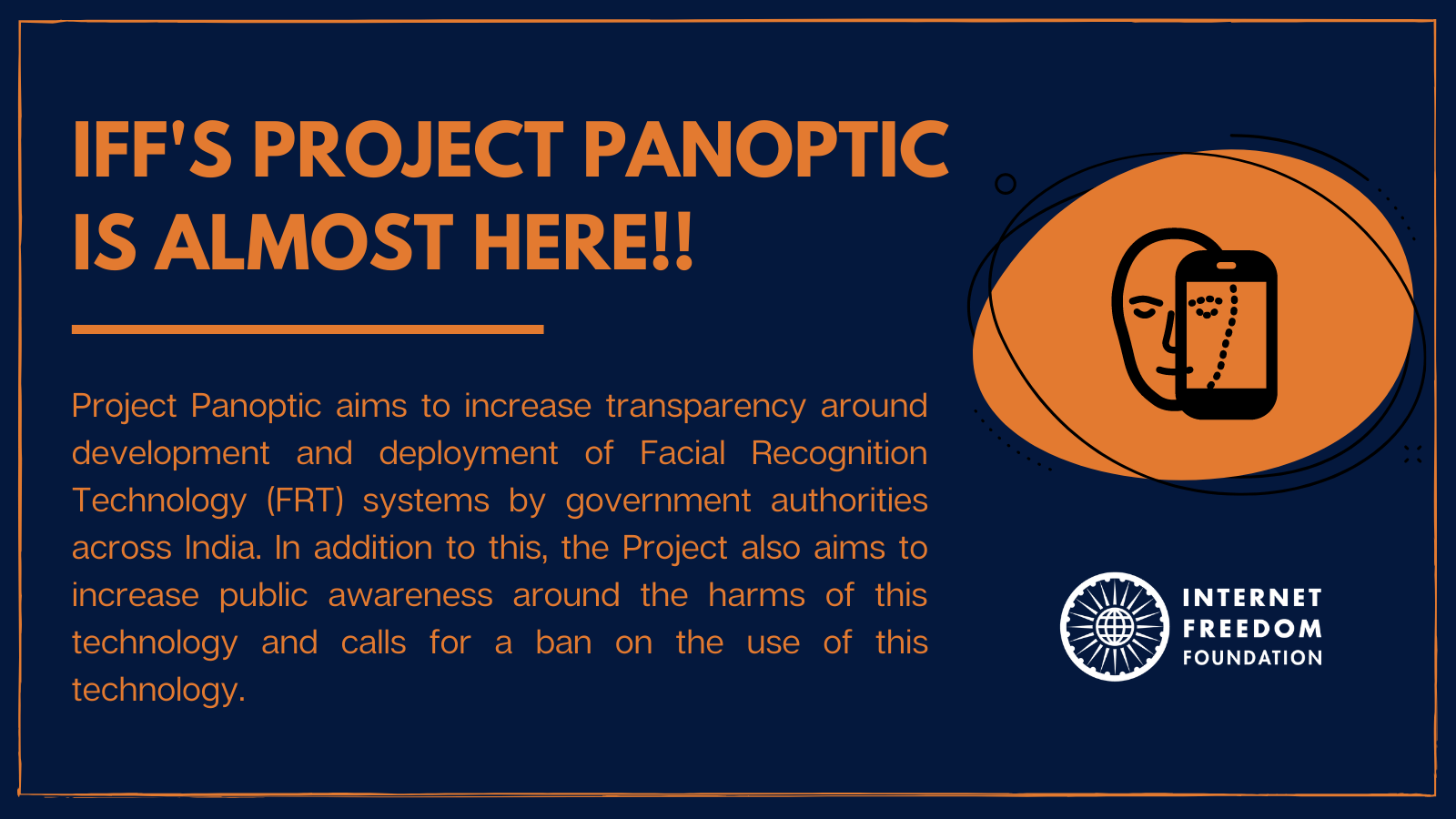
tl;dr
IFF’s Project Panoptic which aims to bring transparency and accountability to the relevant government stakeholders involved in the deployment and implementation of facial recognition technology (FRT) projects in India, is launching soon.
Project Panoptic
Over the course of this year, IFF has been watching closely as the government tries to sneak in Facial Recognition Technology (FRT) into the lives of Indian citizens without most people being aware of the government’s actions as well as the harms that this technology will bring with itself.
Did you know that there are more than 30 proposed government projects of facial recognition which are ongoing in India?
— Internet Freedom Foundation (IFF) (@internetfreedom) November 3, 2020
We have something very exciting coming up. Watch this space for more details! #ProjectPanoptic
Did you know that the government is currently trying to make all Indian airports "paperless" by using facial recognition technology for passenger check-in?
— Internet Freedom Foundation (IFF) (@internetfreedom) November 4, 2020
We have something very exciting coming up. Watch this space for more details! #ProjectPanoptic
Did you know that the Ministry of Railways has allotted 250 Crore INR for the installation of a video surveillance system which includes facial recognition technology in 983 railway stations across the country?
— Internet Freedom Foundation (IFF) (@internetfreedom) November 5, 2020
Concerned? Watch this space for more details. #ProjectPanoptic
IFF has been working tirelessly in ensuring that we keep a track of all the FRT projects that the government is developing and deploying. IFF aims to increase transparency around the implementation and use of FRT projects through the introduction of a digital public resource. This is being done through the deployment of an online dashboard which displays information gathered and collected on various FRT deployments projects across each state relating to the procurement, implementation and use of facial recognition technology projects by the Government of India, State Governments and public authorities in India.
It will be a public resource which will activate informed, evidence based advocacy for legal and technical reforms to protect and advance fundamental rights. This public resource will then be used to drive advocacy on the issue though campaigns and online advocacy. This will enable strategic litigation at the Central and State level by diverse individuals and collectives based on individual harms and injuries that may be suffered by them. The broader aim would be to drive policy changes particularly with regard to data protection legislation in India as well as the introduction of a specific sectoral legislation for facial recognition technology.
What will the platform contain?
The resource will essentially be a website which will consist of an interactive map tracking the deployment of FRT systems by the government across the country. The resource will also consist of case studies specific to certain projects which will provide context for the project as well as our Right to Information findings. One of the main features of the website will be that it will be supported by IFF’s considerable RTI resources. IFF has been filing RTI requests asking for information on each project that we come across to create a database of information which will facilitate us in our drive for transparency and accountability. Through these RTIs we have been able to obtain additional information and context around these projects which shines a light on how the government aims to use these FRT systems.
The launch of this Project is imminent and we hope that our aim of increasing transparency around the use of this harmful technology in India through this platform is achieved. For this, we also need your help and support. The Project will have the functionality of allowing people who access the website to submit information that they may have come across that we may not have displayed on the platform. You can also help in ensuring that our work in building and maintaining this resource continues by donating to IFF to ensure that we keep fighting the good fight.
This project has been built with the help of multiple civic-minded volunteers who donated their time and efforts to us including the teams at DataKind Bangalore and Frappe as well as our amazing design volunteer Shobhit Katikia.
Important Documents
- Introduction to Facial Recognition Projects in India dated February 17, 2020 (link)
- Problems with Facial Recognition Technology Operating in a Legal Vacuum dated February 20, 2020 (link)
- Is the illegal use of facial recognition technology by the Delhi Police akin to mass surveillance? You decide. Dated July 3, 2020 (link)
- IFF's Legal Notice to the NCRB on the Revised RFP for the National Automated Facial Recognition System dated July 15, 2020 (link)
- Watch the Watchmen Series Part 4 : The National Automated Facial Recognition System dated October 7, 2020 (link)

